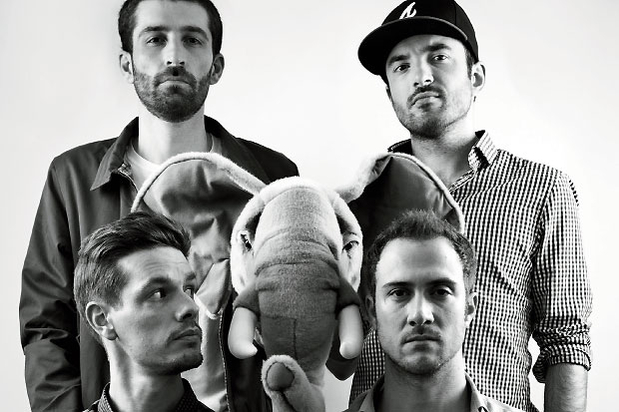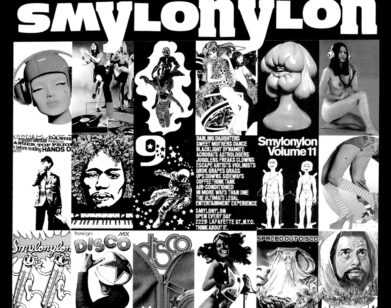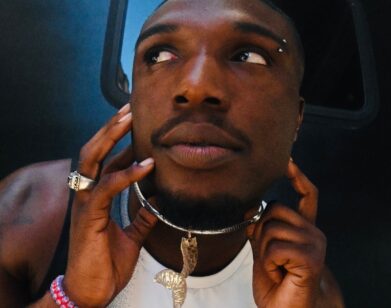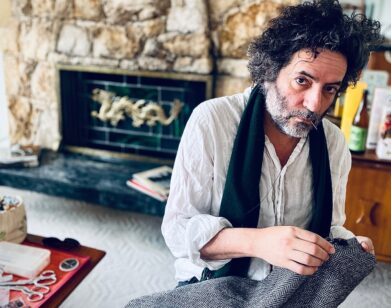C2C is Going Global

ABOVE: C2C
It’s not often a teenage hobby—especially one initially pursued in downtime between the standard adolescent-boy priorities, video-gaming and skateboarding—leads to a career. For the four members of the French DJ team C2C (Pfel, 32, and Greem, 20Syl, and Atom, all 33), the rickety record turntable 20Syl owned started as just another distraction.
But then, something happened: fooling around with “turntablism,” a technique using record turntables and a mixer, they became really, really good. For proof, take their four-year winning streak at the Disco Mix Club (DMC) World Team Championships, from 2003 to 2006.
In performance, they’re pure fun. Unlike many DJs, C2C has never taken to standing still. Rather, they twist, turn, bounce, and switch positions with one another as they spin records, all in a sort of choreography synced with the beat. Various neon shapes, from lip-syncing mouths to geometric orbs, undulate to the music on screens in the front of their turntables.
The band samples fragmented melodies from different countries and cultures, drawing most on old-school American hip-hop, as well as the genre’s roots. “Down the Road,” for instance, takes its name and chorus from a line in blues singer Eddie Cusic’s “You Don’t Have to Go.” Another track mixes jazz icon Louis Armstrong’s “Mack the Knife.” The first notes of “F·U·Y·A” start with a single voice singing, before dissolving into layers of string, percussion, and a humming chorus. In the video, the band appears to be playing in the nave of a Gothic cathedral.
The four members have three bands between them: Greem and 20Syl go by Hocus Pocus, and Pfel and Atom make up Beat Torrent. The two sub-bands sometimes tour separately. The foursome, though, is never apart for long. Their new album Tetra is out this week, and they are about to tour in the United States for the first time, including a high-profile gig at Coachella.
With all this and more on the horizon, Pfel and Greem spoke with Interview about their musical strengths, admitted vocal shortcomings, and pumping up crowds around the world.
RACHEL SMALL: You’re very popular in Europe, but most people don’t know you very well in New York. So, to get some background, how did you the four of you meet?
GREEM: It’s a long story. We met in high school, and we were studying, skateboarding, and playing video games, like friends do. At first, the turntables were just another game we played together. But then, we started competing, and it became more serious.
SMALL: Back in high school, how did you get your hands on those turntables?
GREEM: 20Syl was using a turntable for making hip-hop music in his home studio. He was doing some scratching with old equipment. [laughs] When I was hanging out with him in his home studio I really, totally, fell in love with making music on the turntable. I like the freedom that it gave me, to scratch with any kind of instrument. So after I discovered it, I transmitted the “virus,” so to speak, to my friend Atom, and then he introduced me to his friend Pfel. So then we started playing together, jamming and freestyling with turntables. People like XMan and Beat Junkies were really our models at the time.
SMALL: How did you refine your style?
PFEL: When we were performing at my flat, where we had four or five turntables that we were using to practice, we watched old VHS tapes of old competitions before 2000. We noticed that they were not playing in a really musical way, so we channeled our efforts in to making our sounds more musical. When we started performing in competitions, we would try to find the right track, the right music, to make the crowd go wild.
SMALL: Cool. So it sounds like before you started with the turntables, you didn’t have that much musical background. Were the turntables the first instrument you played?
PFEL: Yeah, it was the main first instrument. We had a little experience with other instruments when we were kids, but nothing big. 20Syl played the horn and the drums. I played the guitar for three years. Atom did too. Um, Greem, can you tell us about your first instrument? [laughs]
GREEM: I’m a, um… a professional percussionist? The triangle, all that stuff… [both laugh]
SMALL: [laughs] So, what was your first big break, and what catapulted you to fame?
PFEL: It took a lot of labor, and progressed slowly. At first, we did a lot in France. Then we went on to the world championships. I think at that time, we were famous in the DJ world—that was very special. Then, when we posted our songs on the Internet and YouTube, we began to break borrders. I remember one year, in 2006, playing at the Cultura Urbana in Madrid, it was crazy, because all the people knew our set from last year. We were really surprised, and that made us realize the effect of the Internet. With our single “Down the Road,” and this upcoming album, we’ve seen that even more.
SMALL: So it seems like you guys are on the verge of becoming known all over the world. Can you tell me a little bit more about your new album? How is it different from what you’ve done before?
PFEL: It’s totally different. With our DMC shows, we were restricted. We could only play six minutes. It was a set format. We wanted really to express our music, our feelings, on tracks, and to make real songs. So, it’s been very special for C2C, that we’ve had a lot of freedom as we composed the songs on Tetra. We are not doing hip-hop music, or electronic music. We don’t want to be limited. So, we’re taking sounds from all over the world, and all ages. Take, for example, “Down the Road.” It’s a really unique mix between old-school stuff, like blues music, and more new school, like hip-hop or electro. So, this album was really realized with this idea that we are free to compose different elements together. So you see a variety in it, but it keeps the essence of C2C, which is, first, a mix of analog and electronic sounds.
SMALL: You were talking about how you like sampling from jazz, blues and other old-school music, like in “Down the Road.” How do you find new sounds like that?
PFEL: First we go through samples to make a rough track, and we don’t limit ourselves. We also have a few instruments in the studio, and we try to reproduce the sound we have in mind, and we might make our own materials, too. We even sing sometimes…
SMALL: Cool. Who’s the best singer?
[both laugh]
PFEL: I have a high-pitched voice. But, yeah, we try to get involved as much as we can, to make our own materials for the sample.
SMALL: How would you describe your sound in just one sentence?
GREEM: Hmm… I would say “world-electro.”
SMALL: Yeah, because you guys are French, obviously, and your sound is very electronic, but at the same time Louis Armstrong is this quintessentially American performer, and “Down the Road” obviously has that cool blues element.
GREEM: When we first started, we all began with hip-hop music, especially from the US. I think we discovered all the other kinds of music through the samples that hip-hop uses. Like, as we were listening, one day we started wondering: This sound, where is this coming from? And which keyboard are they using? And we started discovering other worlds that hip-hop music draws on, like soul and jazz. Really, the roots of C2C come from US hip-hop. As we discovered this music, we were especially inspired by A Tribe Called Quest. They’re really putting a fat beat with the bass, and adding some samples from jazz bands, rock-‘n’-roll, and even from movie soundtracks. And they were doing a really crazy mix, and we wanted to go further with that type of competition. That’s really our roots, like, it’s our thing.
TETRA IS OUT NOW VIA CASABLANCA RECORDS. FOR MORE C2C, VISIT ITS WEBSITE.






